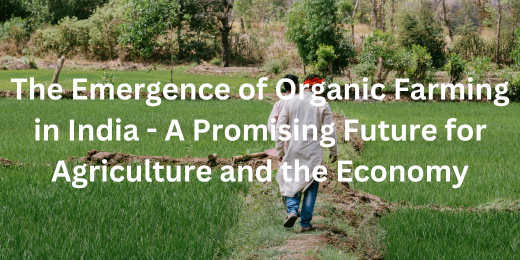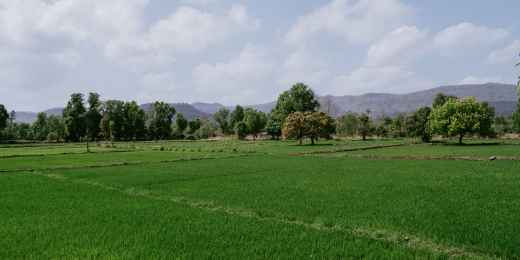
The Emergence of Organic Farming in India – A Promising Future for Agriculture and the Economy
Organic farming in India
The Rise of Organic Farming
In India, there is a growing public concern over food safety and quality. Consumers are increasingly worried about the presence of pesticides and chemicals in their food, which can have adverse health effects. This concern has sparked a shift towards organic farming, where stringent standards ensure produce is free from harmful residues, promoting safer food choices for families across the nation.
Traditional farming methods in India often lead to significant environmental impact. Practices like monoculture and excessive chemical use contribute to biodiversity loss and soil degradation. Organic farming emerges as a sustainable alternative by nurturing biodiversity, enhancing soil fertility through natural methods, and reducing environmental pollution. It aligns with principles that support long-term ecological balance and resilience in agricultural landscapes.
Organic farming in India has seen a steady rise due to its holistic benefits. Organic methods protect soil health and water quality by avoiding chemical fertilisers and pesticides. Moreover, they support sustainable agricultural ecosystems, which in turn improve crop resilience and yield. Embracing organic farming not only ensures healthier food production but also fosters economic opportunities for farmers while safeguarding the environment for future generations.
Empowering Farmers, Strengthening the Economy
Organic farming in India is not just a sustainable agricultural practice but also a significant contributor to economic empowerment. By embracing organic farming, farmers can command higher prices for their produce due to the premium placed on organic products in domestic and international markets.
Government initiatives such as the Paramparagat Krishi Vikas Yojana (PKVY) play a crucial role in supporting organic farming practices across India. These initiatives provide financial assistance, training, and certification support to farmers transitioning to organic methods.
The benefits of organic farming extend beyond individual farms to the broader economy by creating new employment opportunities, particularly in rural areas. Additionally, the emphasis on organic farming enhances India’s reputation as a producer of high-quality agricultural products, leading to increased exports and bolstering the country’s GDP.

The Positive Environmental Impact
Organic farming in India champions sustainable agricultural practices that significantly benefit the environment. By promoting natural techniques like crop rotation and organic fertilizers, organic farming enhances soil fertility and biodiversity. These practices help maintain diverse ecosystems, preserving wildlife habitats and promoting long-term soil health.
In the face of climate change, organic farming plays a crucial role by mitigating greenhouse gas emissions. Unlike conventional farming that relies heavily on synthetic fertilizers and pesticides, organic methods cut chemical inputs, thereby lowering carbon footprints associated with agricultural activities. This eco-friendly approach not only contributes to cleaner air and water but also fosters resilience against climate-related challenges.
Organic farming embodies sustainable principles by prioritizing natural processes over synthetic interventions. Farmers adopt practices that minimise soil erosion, conserve water, and protect natural resources. By embracing these methods, organic farming promotes a balanced ecosystem where agriculture coexists harmoniously with nature, ensuring the longevity of farming landscapes for future generations.
The Health Benefits of Organic Food
Organic farming in India promotes health benefits through chemical-free agricultural practices. By shunning synthetic pesticides and fertilizers, organic food ensures consumers are not exposed to harmful chemicals, supporting overall well-being. This approach resonates with health-conscious individuals seeking safer, more natural alternatives in their diet.
Studies suggest that organic farming methods can enhance the nutritional content of crops, potentially yielding produce with higher levels of vitamins, minerals, and antioxidants. This nutritional richness is increasingly valued by consumers looking to maximise the health benefits of their food choices. As a result, organic farming not only provides safer food options but also contributes to a balanced and nutritious diet.
The move to organic farming is in line with a larger movement towards better living. Consumers are increasingly aware of the connection between diet and health, driving demand for organic products. This consumer interest not only supports sustainable farming practices but also encourages a holistic approach to wellness, benefiting individuals and communities alike.
The Road Ahead for Organic Farming
Organic farming in India faces an optimistic future with potential for growth in land under organic cultivation. Scaling up organic farming is crucial to meet rising consumer demand for healthier, environmentally friendly produce. This expansion not only supports sustainable agricultural practices but also enhances biodiversity and soil fertility.
Establishing robust farmer-to-consumer linkages is essential for the success of organic farming. Direct connections enable farmers to receive fair prices for their organic produce while consumers gain access to fresh, chemical-free food. These direct relationships foster transparency and trust, crucial in promoting the benefits of organic products to a wider audience.
Government policies play a pivotal role in supporting the transition to organic farming. Policies that offer monetary benefits, subsidies, and assistance in terms of expertise motivate more farmers to use organic practices. Such initiatives are vital for creating a conducive environment where organic farming can thrive, contributing positively to both the economy and public health.
India’s Potential in Organic Agriculture
India holds significant promise in organic farming, thanks to collaborative efforts from government and private sectors. Initiatives like the Paramparagat Krishi Vikas Yojana (PKVY) and private investments in sustainable agriculture bolster the adoption of organic practices across the country, ensuring a robust foundation for future growth. For more information on organic farming, visit your nearest Uyir Organic Farmers Market or explore online at www.uyironline.in or www.uyirorganic.farm.
With its vast agricultural diversity and increasing focus on sustainable practices, India has the potential to emerge as a leading player in the global organic farming market. As consumers worldwide seek healthier and environmentally responsible food options, India’s rich organic produce can cater to this growing demand, positioning it favourably in international markets.
The advancement of organic farming not only promises economic opportunities but also contributes to a healthier future. Farmers benefit from enhanced incomes and reduced production costs, while consumers enjoy access to nutritious, pesticide-free food. Moreover, organic farming promotes soil fertility, biodiversity, and water conservation, paving the way for sustainable agricultural practices that benefit both people and the planet.